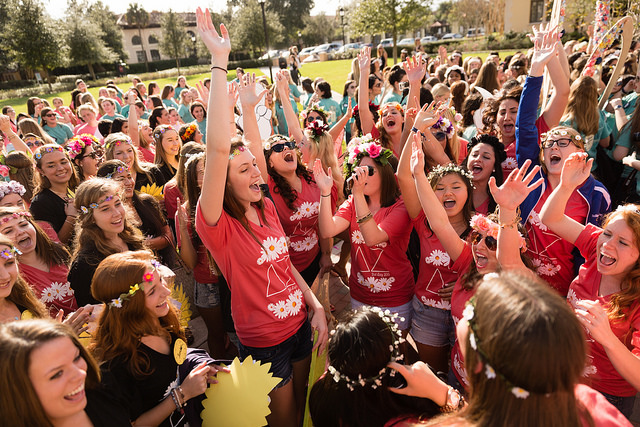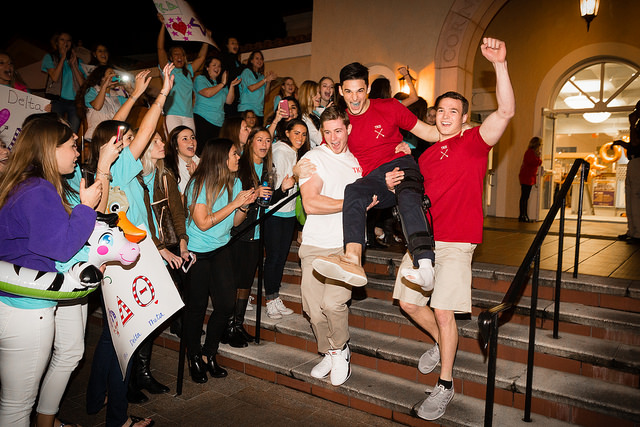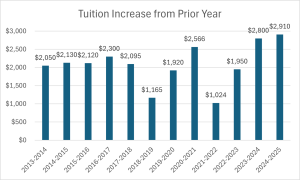With the fall semester coming to a close and winter break just around the corner, many students are setting their sights on the fraternity and sorority recruitments that will take place in early spring semester.
The six fraternities (Chi Psi, Lambda Chi Alpha, Phi Delta Theta, Sigma Alpha Epsilon, Tau Kappa Epsilon, and X Club) and seven sororities (Alpha Delta Pi, Alpha Omicron Pi, Chi Omega, Delta Zeta, Kappa Delta, Non Compis Mentis, and Sigma Gamma Rho) on campus comprise 43 percent of Rollins’ student body and seek each year to add to their numbers.
However, the recruitment process can appear overwhleming or even discouraging to freshmen and unaffiliated upperclassmen who do not understand the nuances of Fraternity and Sorority Life (FSL) at Rollins.
“Recruitment” (also known as “rush” or “rushing”) is the process by which fraternities and sororities gain new members. Unlike many larger universities, Rollins practices deferred recruitment, which means that first-semester freshmen are prohibited from joining an FSL organization.
The Office of FSL defers recruitment so that “first-year students participating in recruitment [can] become accustomed to college classes, get involved in other activities, and make friends before joining a fraternity or sorority.”

After their first semester, a freshman student interested in FSL can choose to sign up for formal recruitment at the beginning of the spring semester or attend any organization’s open recruitment events throughout the following semesters. “I think the deferred recruitment policy is wonderful,” said Addison Cursey ’20 of Alpha Omicron Pi.
“It gives students the opportunity be confident in who they are and not be overwhelmed by the process.” Joe Beguiristain ’18 of Chi Psi added that “compared to my first semester, deferred recruitment helped me appreciate the difference of joining an organization.”
Anyone who goes through the recruitment process is known as a Potential New Member, or PNM. However, there are many differences between the recruitment processes for fraternities and sororities. Sorority recruitment is much more formal and structured, with rigid rules in place to protect against “dirty rushing” and “bid promising,” illicit practices used to guarantee certain PNMs a bid before the end of the recruitment process.
There is a cost to sign up for sorority recruitment ($25, which includes a t-shirt), while there is no cost for fraternity recruitment. While sororities are not allowed to serve food or allow PNMs to leave with anything (including cups, napkins, etc.) during recruitment, fraternities are much more lax in their regulations. Sorority PNMs may only receive one bid at the end of the recruitment process, while fraternity PNMs may receive multiple but can only accept one.
Many of these differences are mandated by the National Panhellenic Council (NPC) and the North-American Interfraternity Conference (IFC), the national governing bodies of sororities and fraternities at Rollins, but they can seem frustrating to those participating in recruitment on either side. Regardless, many members of FSL have wonderful things to say about recruitment.
Beguiristain pointed out that “Within the first semester, I thought I had a grasp of the majority of students on campus. Recruitment allowed me to realize that there was so many students that I hadn’t met yet. As a senior, I am still in touch with peers I had met during recruitment.” Cursey echoed that statement, saying, “All the sororities were welcoming and friendly. I made a lot friends with the other girls going through.”
There are many common misconceptions about the role of fraternities and sororities at Rollins. While they are primarily social organizations, their members spend their time on far more than parties; Cursey stated, “people overlook how much philanthropy work all the organizations do. Almost every week there is [a] philanthropy event that is making an impact in the community.”

Each fraternity and sorority has a philanthropy, or charitable cause they are committed to supporting, and collectively they raise thousands of dollars and log hundreds of hours of community service for these causes.
Other misconceptions include the idea that only freshmen can join FSL, which is simply not true; any unaffiliated Rollins student can go through recruitment at any point after their first semester of freshman year. Transfer students can go through as soon as they arrive.
Christina Myers ’19 of Non Compis Mentis, Rollins’ local sorority, attended their open recruitment in the fall of her sophomore year and is extremely happy with her decision, saying, “I had decided not to go through formal recruitment as a freshman, but I realized in the time between formal recruitment my freshman year and the next fall that I did want to join a sorority.”
Additionally, FSL members stress that the organizations are far more inclusive than stereotypes suggest. Beguiristain stressed the fact that “Rollins’ FSL provides students with a safe home where they can be free to express who they are and what they believe in, regardless of their religion, ethnicity, sexuality, and gender identification.”
Each organization has different values, different philanthropic causes, and different members that represent a wide range of the Rollins student body. Additionally, 8 of the 13 total FSL organizations have houses on campus that provide a residence hall and common space for their members. National fraternities and sororities comprise 11 of the 13 organizations and provide vast alumni networks across America that routinely help students find internships, jobs, and housing after graduation.
The deadline to sign up for sorority recruitment is Dec. 14, and the deadline to sign up for fraternity recruitment is Jan. 24. The links to both registrations can be found online.






Be First to Comment